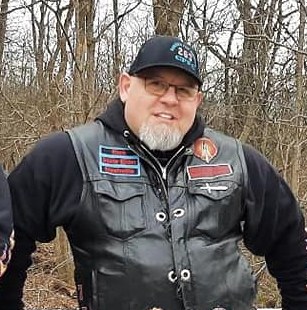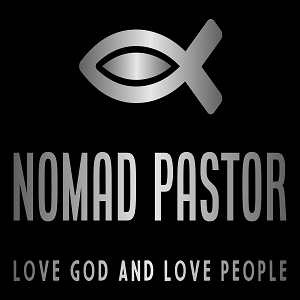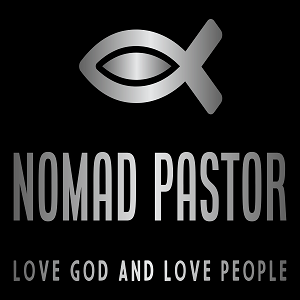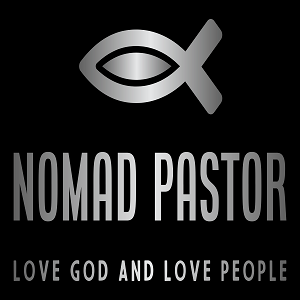Episode Transcript
[00:00:07] Hey, everybody, it's Rick. Welcome back to the Nomad Pastor podcast. Hey, first, I want to start off and apologize. It's been a month since our last episode. You know, life kind of gets in the way, and sometimes so does work. Batman's not with us today just because he's got a ton of stuff going on, too. So we're going to try to get back to our normal schedule here soon, and that may have to change. Right. We've been trying to do once a week, and. And clearly, that's not. That's not working out for us. So we're gonna talk. We'll figure out. We'll pray about it a little bit, decide what. What the. The schedule needs to look at. It may end up going to bi weekly on Wednesdays, but we're gonna figure it out. But, you know, it has been a while, and so I did. I did want to come on and just, you know, talk a little bit. You know, I think today I want to talk a little bit about.
[00:00:51] A little bit about prayer, talk about BFC, psalm, you know, bikers for Christ. We have a motto and that some wish to live within the sound of a church or chapel bell, and we want to run a rescue shop within a yard of hell. And so for us, that means kind of, we're gonna. We're gonna go to everybody, right? And when I think about that, you know, going to everybody, there's. There's some key people in history to talk about. And. And, you know, I'm sure everybody's probably heard of William Booth, or. Or if you haven't heard of William Booth, you've heard of the Salvation army, right? And you generally, you see them on, you know, around Christmas and the holidays, and, you know, the Salvation Army's, you know, they have their bell ringers, and they're trying to raise money. And so William Booth, he actually began the Salvation army in 1865, and he started it to help those who were suffering throughout London. He started to help those who were not willing to attend a traditional church and those, frankly, who were not welcomed into a traditional church. And so when I think about kind of the motto of bikers for Christmas, that's. That's what I think of, right? We're. We're. A lot of times we were people who were not welcomed in church, or we were not willing to go to church because of the judgment that we felt. And William Booth started the Salvation army for that specific reason, right? The thieves, prostitutes, gamblers, drunks. They were among the first converts to Christianity because of William Booth. And as his ministry grew, the gospel of Christ just. It spread throughout the poor community, through the vulnerable, through the destitute, or the people that, you know, may have thought they were destitute.
[00:02:38] And. And it speaks directly to our mission. Right. What our primary mission is, and that's to share the good news through, you know, through Christ, to members of the motorcycle community, to members of the motorcycle world, and to minister to their spiritual and physical needs and the needs of their family.
[00:02:58] We do have a secondary mission as bikers for Christ, which is to minister to the spiritual and physical needs of everybody. Right. All. Not just the motorcycle community. While that is our primary focus, it's also for everyone in need. The orphans, the homeless, the helpless, the bruised or the beaten, the lost, the people that may be considered the least of society, or really, frankly, the people that the world seems to not want, even though we know that the world does. But that's the perception.
[00:03:35] So our job is to share the good news of Christ with them.
[00:03:40] It sounds a lot like what William Booth started.
[00:03:46] He was starting this mission, this ministry for the people who weren't welcome, you know, and I've seen a ton of things about, you know, homeless people not being welcomed in church for whatever reason.
[00:04:02] And. And it really. It just. Frankly, it kills me. It breaks my heart to see it.
[00:04:09] And, you know, the amazing thing is, I've said this many, many times. I listened to tons and tons of podcasts. I listened a lot of audible books, right? But I heard William Booth's story from another podcast that I listened to. And so I really started doing research about William Booth, and I quickly found out that there are some amazing facts about him, about his story and about his life.
[00:04:38] And one of the things that I found very interesting was that he would preach his. You know, from what people said, he would preach until something broke.
[00:04:49] He never just preached a sermon for 30 minutes. He just kept going and going and going until something broke. Till something broke open. The Holy Spirit.
[00:05:02] He would preach until he felt the Holy Spirit intercede in his ministry. And sometimes that preaching would last for hours.
[00:05:14] And during that time, while he was preaching, for hour after hour after hour, waiting for the Holy Spirit to intervene, right in the middle of his preaching, he would randomly stomp on the stage, and he would yell, pray. He would scream into the top of his lungs, pray.
[00:05:32] And for a long time, people didn't know why he did that.
[00:05:37] They just thought he, you know, he was. They were saying, pray. He wanted everybody to pray.
[00:05:45] But what was happening was amazing, you know, for me to think about him not stopping. He didn't have a prepared sermon for a long time. When I first started this podcast, I had everything very prepared, very scripted. I knew exactly what I was going to talk about, and I even had the words prepared. Now, I may not have read it word for word, right? But I knew. I knew exactly what I wanted to say.
[00:06:22] And I knew because I practiced, that it would take twelve minutes or 15 minutes or 30 minutes or whatever that time looked like. And as I prayed through that process, and God said, you need to. You need to do more than. Than this, right?
[00:06:40] This message needs to be more than you writing a 15 minutes sermon and then reading it online, which was really scary to me, but I listened, and then that's where Batman came in. And through prayer, we agreed that this was the right solution. And so it was hard for me at first, because all of a sudden, Batman and I are like, okay, we're not. We're not going to prepare. We're just going to. We're just going to talk. We're going to let the Holy Spirit intercede in that moment so that we're just talking about God and we're praying that God will intervene in somebody's life as they listen to it.
[00:07:23] Well, that's what William Booth was doing. He would just start preaching and he would keep going until he felt the Holy Spirit intervene.
[00:07:37] Most people know about the Salvation army and the global reach that it has.
[00:07:45] So when we talk about William Booth and the Salvation army, most people are going to be like, yep, I know that dude. I know. I mean, that's amazing. What he has done is amazing. What this organization does and continues to do today that started way back in 1865 is amazing.
[00:08:04] So the question I have, right, is, so we know who the Salvation army is. We know who William Booth is. But do you know who John Lawley was?
[00:08:13] You see, John Lawley, at the age of 17, became a Christian because of the meetings of William Booth. He attended the meetings led by Booth, and then in 1877, he became a Christian. And over his life, he rose through the ranks of the Salvation army. And he eventually became, like, Booth's right hand, right? They called him his aide de camp.
[00:08:42] And I'm going to be honest, I didn't know what that meant. I had to go research it. But it's a french term for, like, his helper. He was like his personal assistant.
[00:08:51] And, you know, in London, in the United Kingdom at that, at this time, he was like a. The ADC was like a confidential officer to the general, right? He was the guy. He was. If. If Booth wasn't available, he was his mouthpiece, right? It was like he was speaking for him, and people had to obey that, right? So Lolly traveled with Booth everywhere he went, right? He sang, he led prayer meetings, he gave altar calls. When. When Booth wasn't there, he preached.
[00:09:28] But he was.
[00:09:30] This guy, John Lawley was amazing. He was a prayer warrior, right? And when I say prayer warrior, he was a prayer warrior.
[00:09:40] And I look at myself and I think, I pray. I still gotta look things up. I still don't understand things. I still need to figure out what's going on. And so I consider myself. Even after all of these years, I still consider myself a baby Christian because I still. I'm still doing research and I'm still trying to figure out what things mean.
[00:10:04] And so when you think about an intercessory prayer warrior, what makes somebody that? How is that different from any other prayer?
[00:10:18] And so I went to the Bible, right? What does the Bible say about it? And the Bible defines an intercessory prayer as praying on the behalf of someone else to make a petition on behalf of an individual.
[00:10:32] And really, that's where Laul is. An influence and rise of the early formation of the Salvation army is probably the greatest.
[00:10:42] He would pray on behalf of Booth with great.
[00:10:49] What's the word I'm looking for? He was very fervent in his prayers. Great fervency. And he would do this on behalf of Booth.
[00:10:58] And the amazing thing about this, as I was doing my research, you know, I said earlier on that, that Booth would just be preaching for hours and hours and hours, and he would be stomping on the stage and he'd be yelling, pray.
[00:11:12] But what people didn't know is when he was stomping the stage, he was stomping it for the man underneath it.
[00:11:22] John Lawley, his personal assistant, his right hand, his. His. Whatever you want to call it, right? You know, his mouth, his voice when. When he wasn't around, was under the stage every time that he preached. And he was so committed to the Salvation army, he would spend hours under there before Booth would ever get on stage. Lolly would crawl underneath it, in the mud, in. In the dirt, in the spiders, with the rats. It didn't matter. Didn't matter what the condition was. He still was getting under the stage.
[00:11:56] And once he was there, he would be on his face and he would pray. The entire time booth was preaching, he was spiritually lifting him up and praying for him.
[00:12:09] And when William Booth, during his sermon felt like there was this wall, the spiritual wall that he had to overcome.
[00:12:19] He would stomp the stage.
[00:12:21] He would stomp the stage and he would yell, pray. And what he was doing was he was asking John Lawley to pray so that this wall could be torn down and he could move on so that the Holy Spirit could intercede. That's what he was waiting for. This prayer warrior was tearing down spiritual walls as they were built to fight the adversary and bring people to Christ.
[00:12:51] In, in ministry, in any ministry, we need those prayer warriors.
[00:12:59] You know, I know that, that we all pray for each other, right? I know that. There are a ton of people who pray for me.
[00:13:06] There's a ton of people who pray for bikers, for Christ. There's a ton of people who pray for Batman and forged brotherhood. Christian Motorcycle club. There are people that consistently pray for us.
[00:13:18] What I'm saying is we need dedicated praying for our ministries.
[00:13:26] We need dedicated praying for this podcast.
[00:13:31] You know, some of us are called to stomp the stage.
[00:13:35] Whatever we're going through, we have the ability to partner with God, to see impossible things happen, to see impossible things done by God, not just in our lives, but in the lives of the people that we minister to.
[00:13:50] In two chronicles 714, it says, if my people who are called by name, will humble themselves and pray and seek my face and turn from their wicked ways, then I will hear from heaven, and I will forgive their sin, and I will heal their land.
[00:14:07] He's saying, if my people who I know humble themselves and pray, I will forgive their sin and I will heal them. I will heal their land.
[00:14:21] And then Ephesians 312, it says, in him, and through faith in him, we may approach God with freedom and confidence.
[00:14:30] Look, you hear Batman, and I say all the time that you need to love God and love people. We say it at the end of every podcast, love God. Love people.
[00:14:44] So if we just break that down real easy, what does it mean to love God?
[00:14:51] First, loving God requires us to know him. And that starts with his word.
[00:14:57] And I know that it probably sounds simple, but to know God, to know his word is to love him.
[00:15:10] We must worship God and praise him.
[00:15:14] Look, I'm not going to read all of them, but the book of Psalms, frankly, I'm not going to read them all because it would take a long time. I could probably do one podcast or two or three podcasts on each psalm themselves. Right? But, but the Book of Psalms, it just has a, a ton of beautiful examples of how to worship and praise God. Like you should read. Like, if you're, if you're struggling, like, what should I do? Maybe go read one psalm every day.
[00:15:46] Just read and study. Don't just read it to read it, read it to. To hear it.
[00:15:54] But you can look at psalms 819 232499. 117. That's just a few of them. But they are just amazing examples of how to worship and praise God. Loving God means you put him first.
[00:16:10] You put him first.
[00:16:12] There's this website called I am second.
[00:16:16] It's iamsecond.com dot. You can go look it up, right? And in that, you can view tons of stories from people about their relationship with Christ, about how they came from the depths to get where they are, how they came from, just what could possibly be utter despair.
[00:16:40] And they do that because God loves them.
[00:16:47] But the only way to do that is to be second to God, right? They had to put God first, their selves, their desires, their everything second.
[00:16:59] That's why it's called I am second, right.
[00:17:01] They love God by putting him first.
[00:17:06] It's the most important, right. Mark 1230. Love the Lord your God with all of your heart, with all of your soul, with all your mind, and with all of your strength.
[00:17:16] That's the most important.
[00:17:18] I think love people is self explanatory, right. And the best way, I'm not going to read scripture about it. I'm not going to go into detail. Well, I might talk about it a little bit. But if you put God first and you draw close to God through his word, through prayer, through worship, through everything that you do, if you put God first, then he's going to put it on you, on your heart, in your spirit, through the Holy Spirit, right? We're blessed with this gift of the Holy Spirit. And the closer we draw to God, the more we're going to love people.
[00:17:57] We're supposed to love people like we love ourselves, like we love, like, we're just supposed to put them there.
[00:18:03] They're supposed to be important in everything that we do.
[00:18:06] Now, look, it doesn't say like them, right? It doesn't say be best friends with them. It doesn't say, you know, hang out with them every day.
[00:18:16] But you have to love them.
[00:18:19] You have to love them regardless of the past, regardless of what they may have done to you, regardless of what they may be able to do to you, or maybe what they said to you or how they treated you or how they reacted or whatever it may be. At the end of the day, we're called to love them.
[00:18:39] So do that love God and love people.
[00:18:48] So how do I want to end this?
[00:18:51] If you've listened to this podcast very often, I'm going to ask you to pray for us, to add us to your daily prayers, to add the members of bikers for Christ to your daily prayer, to add the ministry of Bikers for Christ to your daily prayer, to add the ministry of forged brotherhood to your daily prayer.
[00:19:16] To add the members of forged brotherhood to your daily prayer.
[00:19:19] To add your pastor to your daily prayer. Your pastor and the pastors that are out today, the people that are pastors today, they are called to stomp the stage.
[00:19:35] They're called to be in the front and they need prayer warriors to keep them up, to tear down those spiritual walls. They need prayer warriors to lift them, to help them, to protect them, and to allow the holy spirit to intervene in the ministry that they are performing.
[00:20:03] It's important.
[00:20:05] This isn't a I'm gonna go to church on Sunday, I'm gonna check the box and I'm gonna go home and I'm gonna forget about everything.
[00:20:13] Our pastors need prayer.
[00:20:19] Be that prayer warrior for them.
[00:20:22] And if you're called to stomp the stage, go do it. Don't wait.
[00:20:28] Don't hesitate. I, you know, you've heard me say this for a long time. I waited for years and ran away from the calling that, that I knew God had put on my heart because I was afraid.
[00:20:42] I pray. I am not what I would consider a prayer warrior. I pray every day. I pray multiple times a day. But I wouldn't say I'm an intercessory prayer warrior. But I need them.
[00:20:56] I need them. I think my wife is a prayer warrior and she never gave up on me when I wasn't a Christian. You got, you know, if you've listened to this test, this podcast, you've heard my testimony. When I wasn't a Christian, she prayed for me.
[00:21:10] She was my prayer warrior and she continues to be.
[00:21:16] So I'm going to ask that you add us to your daily prayers, that you spend time with the Lord. And if you're called to stop the stage, don't run away from that calling. Get out there and do what God is calling you to do. It may be the one thing that somebody needs to hear that brings them to the kingdom. You may be the person they're waiting for.
[00:21:39] So don't wait again. This is Rick with the Nomad Pastor podcast. Look, I love being here. I love having this platform and this opportunity. And I just want to remind you again to love God. And love people.




